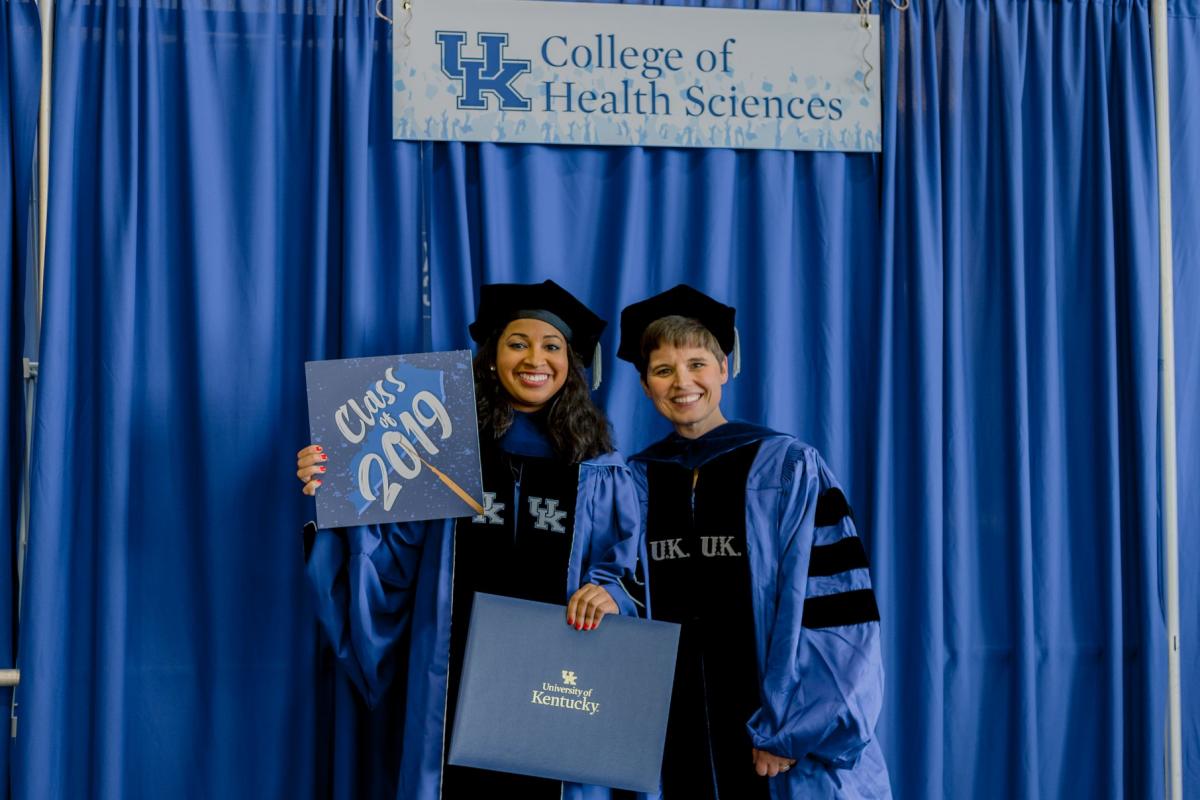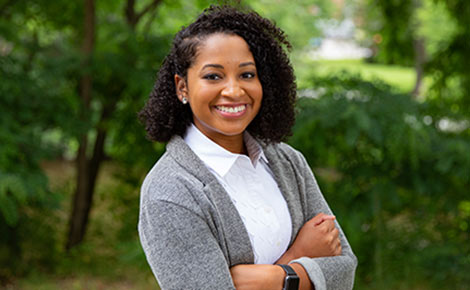‘My Big Blue Home’
Feb 9, 2021CHS Alum Breaks New Ground Studying the Psychology of Injury
5 Questions with … Shelby Baez, PhD, ATC
by Ryan Clark
CHS Director of Communications
Shelby Baez knew she wanted a career in athletic training when she was in high school.

As a four-sport athlete growing up in Fayetteville, N.C., (that’s basketball, softball, volleyball and cross country, if you’re curious) she watched what her school’s athletic trainer did to help athletes, and — after working as a lifeguard — she thought maybe she could do something similar. What she did not know is that by age 29, she’d have her doctorate from UK, she would be an assistant professor at a Big Ten school, and that the work she’d done while in college would be utilized to study the psychological aspects of injury.
Baez received her Master’s in Athletic Training in 2016 and her PhD in Rehabilitation Sciences in 2019, was awarded the Doctoral Dissertation Award from the Association for Applied Sport Psychology (AASP) for her outstanding contributions to injury rehabilitation research. After her graduation in 2019, Baez was hired as an assistant professor of kinesiology at Michigan State University where she is also the director of MSU’s Behavioral Research and Athletic Injury Neuroscience (BRAIN) Lab.
She says she owes it all to the people at UK who helped her along the way.
Here’s 5 questions with Shelby Baez, PhD, ATC:
CHS: Why UK?
SB: UK has a reputation for being one of the top Athletic Training education programs in the nation, so it was a no-brainer when I got an offer to come to the master's program. And then, once I was immersed with the faculty and the research opportunities, having the opportunity to come back and complete my PhD just made sense.
The faculty supported my research agenda and just supported me as a human, so it just felt like a really good fit.
It was nice to be able to come full circle and finish. UK is just known for athletic training. If you want to do well in athletic training you go to Kentucky.
CHS: Why Athletic Training?
SB: My original plan was to become a journalism major, then go to law school and then become a political correspondent for Good Morning America (laughs). That was my plan.
And then, you know, life happens and I actually started lifeguarding and I played sports for many years in my life and I got a taste of what sport and medicine can be like. Then I had an athletic trainer in high school. That and my lifeguarding days gave me the taste of what it would be like to work in a sports-medicine capacity, and it led me to athletic training.
CHS: What was your favorite memory about your experience at UK?
SB: That’s a really tough question. First, to be able to have access to the SMRI and neuroimaging for my dissertation. In the Sports Medicine Research Institute, I was able to work with my mentor and we developed lower-extremity reaction time tasks that now may potentially be integrated in return-to-play protocols. FitLight Trainers are these little things that have LED lights and can measure reaction time. What's nice is that you can arrange them in different ways, so you can measure lower-extremity function. You can measure just simple cognitive tasks using these devices, so that’s what we did.
For lower extremity injuries, like ACL injuries, we developed a reliable task to assess lower-extremity reaction time.
We asked athletes to stand on one leg, or to step on the lights, and we measure their reaction time. We can compare discrepancies between the uninjured and injured. But what I do isn't necessarily just looking at what's happening in the brain, but what's happening in the brain from a psychological perspective.
My area of expertise is actually how things like injury-related fear can change reaction time, how it can affect outcomes after injury, and how it can change brain activity.
For instance, when one sustains an ACL injury, they’ve already seen in the media that this is a serious injury. Maybe it’s career-ending. Maybe it’s season-ending. They know you don’t want to get this injury. So when someone sustains it, they automatically have this negative outlook. The concept of assessing brain function after knee injury has become quite the hot topic in the past couple years.
Here at Michigan State we're now integrating that lower-extremity reaction time task for all our patients going through sports medicine. And I’ve heard some other universities are considering using the the task as well. I know Kentucky is still using it.
Overall, I had really good labmates at UK. We were all really supportive of each other. It was all part of what helped allow me to get this job at Michigan State.
CHS: Are you still able to keep up with CHS and what’s going on at UK?
SB: Yes, I still keep up with my professors and my classmates. And there are so many things going on in the College now. The formulation of the DEI committee, for instance. That’s the first step to acknowledging systemic issues. It’s a very positive thing. I think the College is really supportive and wants to figure out how to be effective in making changes and making the environment as supportive as possible for students of color, as well as for LGBTQ+ students and anyone that isn't part of the majority.
I know I was able to talk with my program director and others about issues I had as a student of color — and these were met with action. As a College, we were already a bit ahead of the game, especially compared to some other universities.
CHS: What would you tell a student who is interested in studying AT at UK?
SB: Well, if they’re interested in athletic training, I’d tell them they're not going to find a better clinical program than at UK.
The faculty are phenomenal. They go above and beyond for their students. They were an open source of information for me at all times.
There’s just something about the College of Health Sciences at Kentucky. You won’t find anything better.
You know, I miss my Big Blue home (laughs) — they're all just great people there.
___________________________________________________________
February is Black History Month
Since 1976 the United States and Canada have designated the month of February to recognize the contributions of people of the African diaspora. The College of Health Sciences will be recognizing and honoring some of our own Black alumni and students throughout the month – celebrating success while we also acknowledge both historical and current inequity and the work that each of us must do to dismantle systemic racism. We also hope members of our community will join with the MLK Center for events throughout the month.

